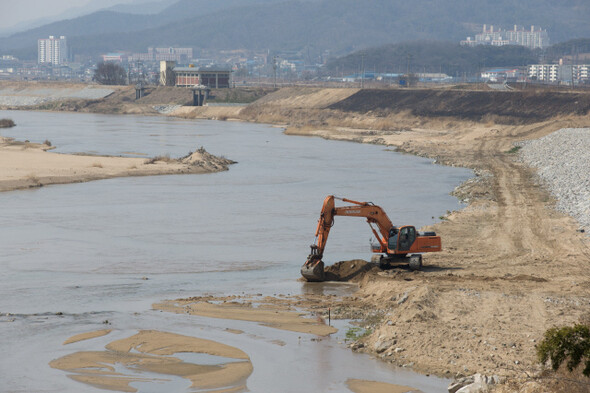hankyoreh
Links to other country sites 다른 나라 사이트 링크
More money being sunk into disastrous Four Major Rivers Project

By Kim Kyu-won and Kim Kyung-rok, staff reporters
The Ministry of Land, Infrastructure and Transport is requesting money from the Ministry of Strategy and Finance for interest and principal repayment on the 8 trillion won (US$7.9 billion) in debt incurred by the Korea Water Resources Corporation (K-water) for the Four Major Rivers Project.
Critics are accusing the administration and K-water of using taxpayer money to cover losses from a costly project that was carried out despite strong objections at the time.
Initially, the administration of former President Lee Myung-bak (2008-13) said the principal from the project’s debt would be repaid by K-water out of development earnings, with the government to cover interest payments until the project’s completion.
The Ministry of Land, Infrastructure and Transport said on June 30 that the 2015 budget it recently submitted to the Ministry of Strategy and Finance included a total of 397 billion won (US$392 million) for the project, including 80 billion won (US$79 million) in principal repayment and 317 billion won (US$313 million) in interest on K-water’s total project debt of 8 trillion won. This amount would be added to the 1,238 billion won (US$ 1.22 billion) already provided to K-water for Four Major Rivers Project interest repayments through 2014.
The difference this time is that the 2015 budget request asks for support not only on interest, but on the principal. It followed a decision made at a national policy coordination meeting in September 2009, which had the government covering all interest payments on K-water’s 8 trillion won investment through the project’s end, with the principal to be repaid from development earnings. According to the decision, a more detailed support plan would be developed for any shortfall, taking into account K-water’s financial situation after the project’s completion.
“We took 2014 as the project completion date and made a request for assistance on principal repayments,” explained Son Byeong-seok, chief of the Ministry of Land, Infrastructure and Transport’s water resource policy office, adding that a plan on principal support would be developed by late August.
The original plan when K-water was selected to participate in the project was to have the principal for any debt repayment with investment earnings from the development of so-called “hydrophilic zones.” These included urban and housing development around the river basins, with earnings going to pay down the debt.
But the only hydrophilic zone project completed to date is Eco Delta City in Busan. At the current rate, it is uncertain if even after a decade it would generate any profits.
“All they’ve done is keep putting off the completion date for a project that was basically finished by 2012, with the government providing support on interest through 2014,” said Lee Mi-kyung, a New Politics Alliance for Democracy lawmaker and member of the National Assembly Land, Infrastructure, and Transport Committee.
“If the government is footing the bill for the principal repayments K-water was supposed to make, that means we’re pouring even more money into the failed Four Major Rivers Project,” Lee added.
Korean Federation For Environmental Movement secretary-general Yeom Hyung-chul recommended demanding indemnity rights from the K-water board of directors that decided on the 8 trillion won investment.
“K-water also needs to come up with its own rescue plan, including things like asset sales, wage cuts, and cost-cutting,” Yeom said.
“We should also consider claiming indemnification rights for the people who actually spearheaded this disaster of a project - Lee Myung-bak, former Land Ministers Chung Jong-hwan and Kwon Do-youp, and project headquarters chief Shim Myung-pil,” he added.

Please direct questions or comments to [english@hani.co.kr]

Editorial・opinion
![[Column] Park Geun-hye déjà vu in Yoon Suk-yeol [Column] Park Geun-hye déjà vu in Yoon Suk-yeol](https://flexible.img.hani.co.kr/flexible/normal/500/300/imgdb/original/2024/0424/651713945113788.jpg) [Column] Park Geun-hye déjà vu in Yoon Suk-yeol
[Column] Park Geun-hye déjà vu in Yoon Suk-yeol![[Editorial] New weight of N. Korea’s nuclear threats makes dialogue all the more urgent [Editorial] New weight of N. Korea’s nuclear threats makes dialogue all the more urgent](https://flexible.img.hani.co.kr/flexible/normal/500/300/imgdb/original/2024/0424/7317139454662664.jpg) [Editorial] New weight of N. Korea’s nuclear threats makes dialogue all the more urgent
[Editorial] New weight of N. Korea’s nuclear threats makes dialogue all the more urgent- [Guest essay] The real reason Korea’s new right wants to dub Rhee a founding father
- [Column] ‘Choson’: Is it time we start referring to N. Korea in its own terms?
- [Editorial] Japan’s rewriting of history with Korea has gone too far
- [Column] The president’s questionable capacity for dialogue
- [Column] Are chaebol firms just pizza pies for families to divvy up as they please?
- [Column] Has Korea, too, crossed the Rubicon on China?
- [Correspondent’s column] In Japan’s alliance with US, echoes of its past alliances with UK
- [Editorial] Does Yoon think the Korean public is wrong?
Most viewed articles
- 1[Guest essay] The real reason Korea’s new right wants to dub Rhee a founding father
- 2Senior doctors cut hours, prepare to resign as government refuses to scrap medical reform plan
- 3[Column] ‘Choson’: Is it time we start referring to N. Korea in its own terms?
- 4New AI-based translation tools make their way into everyday life in Korea
- 5Opposition calls Yoon’s chief of staff appointment a ‘slap in the face’
- 6Why Korea shouldn’t welcome Japan’s newly beefed up defense cooperation with US
- 7[Editorial] Japan’s rewriting of history with Korea has gone too far
- 8Terry Anderson, AP reporter who informed world of massacre in Gwangju, dies at 76
- 9[Column] Has Korea, too, crossed the Rubicon on China?
- 10[Column] The clock is ticking for Korea’s first lady